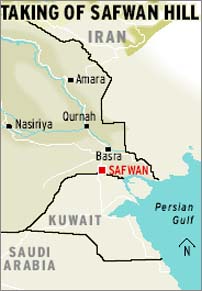
 |
|
| Home > War on Iraq > Article | Saturday March 22, 2003 |
|
|
||||||||||||||||||||||||||||
 |
Herald Correspondent Lindsay Murdoch, travelling with a Marines artillery unit, reports on one of the war's first battles on the Iraq-Kuwait border.
There was little initial resistance as the United States Marines swept into southern Iraq early yesterday. One of the first encounters of the ground war was more like a massacre than a fight.
The Iraqi gunners fired first, soon after United States President George Bush announced the attack on Saddam Hussein was under way.
It was a fatal mistake.
The Iraqi artillery unit, preparing for the American invasion, had tested the range by firing registering shots at a likely spot where the American tanks would cross from Kuwait. US radar picked up the incoming shells and pinpointed their source.
Within hours, the Iraqi gunners and their Russian-made 122mm howitzers
were destroyed as the Americans unleashed an artillery barrage that shook
the ground and lit up the night sky with orange flashes.
"Dead bodies are everywhere," a US officer reported by radio.
Later in the day, the American firepower was turned on Safwan Hill, an Iraqi military observation post a couple of kilometres across the border. About six hours after US marines and their 155mm howitzer guns pulled up at the border, they opened up with a deafening barrage. Safwan Hill went up in a huge fireball and the Iraqi observation post was obliterated.
"I pity anybody who's in there," a marine sergeant said. "We told them to surrender."
The destruction of Safwan Hill was a priority for the attacking forces because it had sophisticated surveillance equipment near the main highway that runs from Kuwait up to Basra and then Baghdad. The attacking US and British forces could not attempt to cross the border unless it was destroyed.
Marine Cobra helicopter gunships firing Hellfire missiles swept in low from the south. Then the marine howitzers, with a range of 30 kilometres, opened a sustained barrage over the next eight hours. They were supported by US Navy aircraft which dropped 40,000 pounds of explosives and napalm, a US officer told the Herald.
A legal expert at the International Committee of the Red Cross in Geneva said the use of napalm or fuel air bombs was not illegal "per se" because the US was not a signatory to the 1980 weapons convention which prohibits and restricts certain weapons. "But the US has to apply the basic principles of International Humanitarian Law (IHL) and take all precautions to protect civilians. In the case of napalm and fuel air bombs, these are special precautions because these are area weapons, not specific weapons," said Dominique Loye, the committee's adviser on weapons and IHL.
When dawn broke on Safwan Hill, all that could be seen on top of it was a single antenna amid the smoke. The marines then moved forward, their officers saying they were determined to push on as quickly as possible for Baghdad.
The first air strike on Baghdad, and Mr Bush's announcement that the war was under way, appeared to catch US officers in the Kuwait desert by surprise.
The attack was originally planned for early today. But the US officers did not seem worried.
Within hours of Mr Bush's announcement, a vast army of tanks, trucks, bulldozers and heavy guns was surging through the dust of the Kuwaiti desert to positions on Iraq's border.
![]() Printer
friendly version
Printer
friendly version ![]() Email
to a friend
Email
to a friend
War On Iraq
| text | handheld (how to) | membership | conditions | privacy Copyright © 2003. The Sydney Morning Herald. |
advertise | contact us |